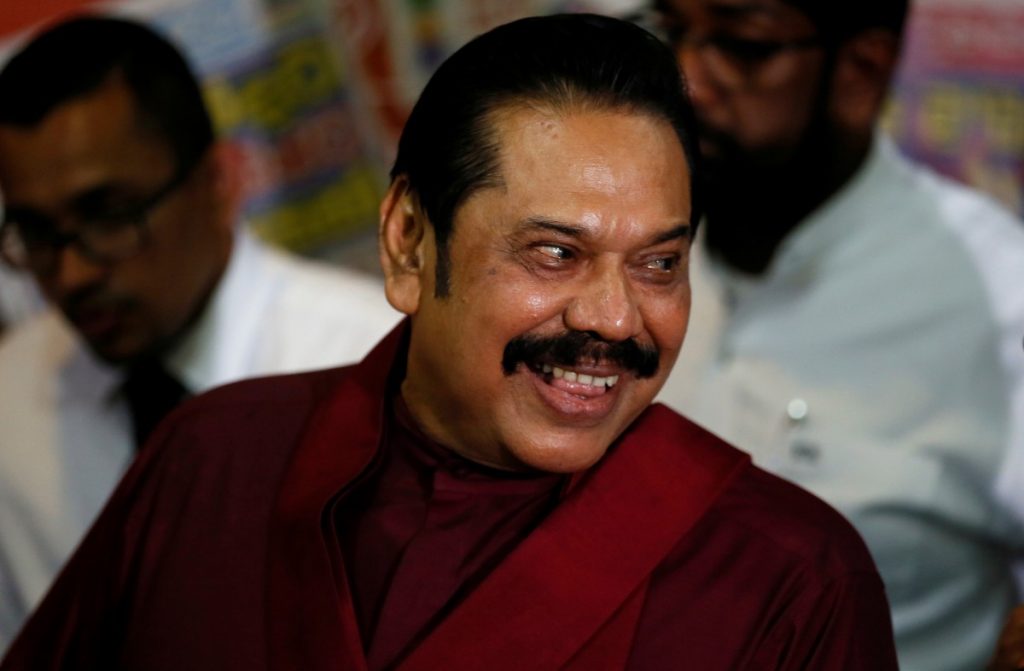Sri Lanka is in deep political turmoil. The party led by President Maithripala Sirisena is breaking its alliance and pulling down the government. He has temporarily suspended parliament, installed strongman Mahinda Rajapaksa as PM, and the parliament speaker is backing the continuation of Prime Minister Ranil Wickremesinghe and his government. A constitutional crisis of immense proportions is staring point blank at the island nation slowly recovering from long years of Tamil militancy and resultant collapse of the national economy. It’s too early to say whether the ‘China factor’ too is central to the present political upheaval, and India should be wary of what’s happening.
President Sirisena claimed a week ago that India’s external intelligence, the RAW, was baying for his blood. He qualified the statement with a footnote that it was not necessary that an assassination attempt was being contemplated with the knowledge of Prime Minister Narendra Modi. He also blamed the Wickremesinghe government of not being serious about this perceived threat to his life. Either the President had unassailable information that RAW targeted him or, it is also likely that he was creating the necessary conditions for a break of his alliance with his Prime Minister’s party.
What one knows is, India’s tenuous links with Sri Lanka are weakening further. A previously scheduled meeting between Modi and Wickremesinghe took place in New Delhi days after Sirisena’s chest-beating. With the new developments in Sri Lanka, chances are that a crafty Rajapaksa would gain the upper hand in national politics — unless a miracle happens or court intervenes to reverse the presidential proclamations. This could mean the island nation would edge closer to China and keep India at a distance. The island nation is also in the grip of a bad economic situation. Issues like the Chinese loans to Sri Lanka and their repayments might be sorted out. Former PM Rajapaksa, a close ally of China and a strong-willed administrator, could get as much done if he takes back power.
It is no secret that India is faced with a serious predicament when it comes to maintaining relations with its neighbours. There, for now, is a positive turnaround in Maldives following an election verdict that put a strongly pro-China leader in cold storage, maybe for the time being. This is small comfort. The rest of regional diplomacy is a disaster including with Bhutan and Bangladesh. Newly installed Pakistan PM Imran Khan, who initially showed a willingness to talk with India, has changed his stance. He now wants to wait for the 2019 Lok Sabha poll results to know who would in future call the shots in India, and then decide on talks.
There are fresh problems in the LoC, including a spurt in militancy with backing from the Pakistan army after a brief period of lull. Afghanistan is increasingly turning away from India while both China and Russia have cast glances at it with economic and other support. Nepal’s Oli government, it would appear, has no love lost for India. China keeps browbeating India with increased fervour. Doklam remains a live issue, unsolved. By calling the Bangladeshi migrants in India as termites, BJP chief Amit Shah has contributed substantially to an increase in the anti-India sentiments in that country, despite the support that Prime Minister Sheikh Hasina has given for long.
When it comes to diplomacy, India’s first call should be to strengthen relations with its neighbours. The rest can wait. But, ever since Prime Minister Narendra Modi took charge nearly five years ago, things are obviously moving in the reverse direction. The take-off for Modi happened under dramatic circumstances, with leaders of neighbouring nations, including Pakistan, lining up to hail him in New Delhi. Today, much of such goodwill has been squandered away. Opportunities were lost for no reason at all. It is educative to know that the White House is not keen on accepting an invitation from India for President Donald Trump to be present at the next Republic Day parade. That speaks volumes about the claims that the leaders of the two countries have built a strong personal chemistry. It could also be suspected that Trump wants to wait and watch as to how the next General Elections turn out to be, rather than getting closer to Modi or the present government. This kind of uncertainty on the part of all concerned is very palpable now. This also clearly demonstrates that India’s foreign policy is not considered stable enough by the international policy makers. This has, in turn, weakened the country’s image and made it look like it is of very little consequence.
